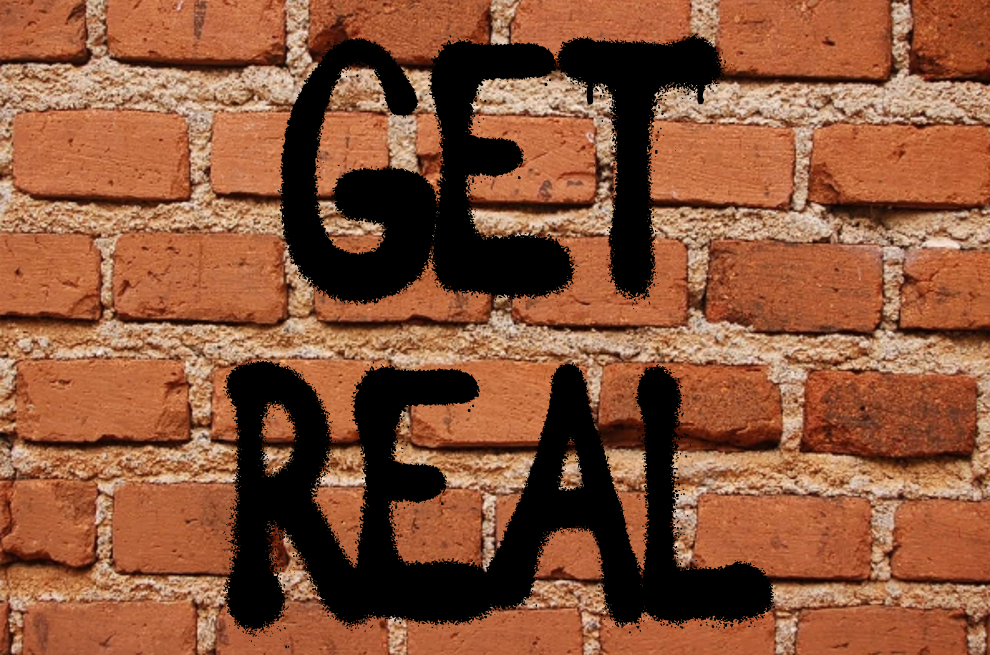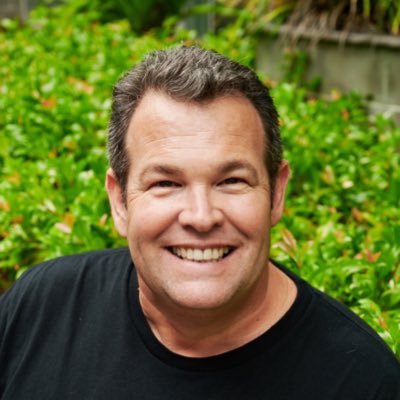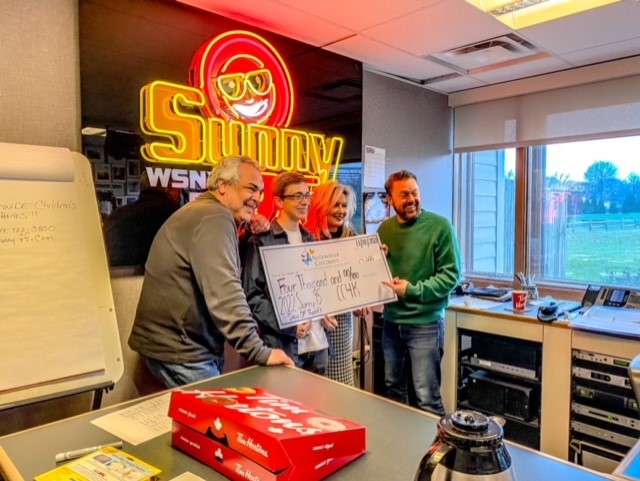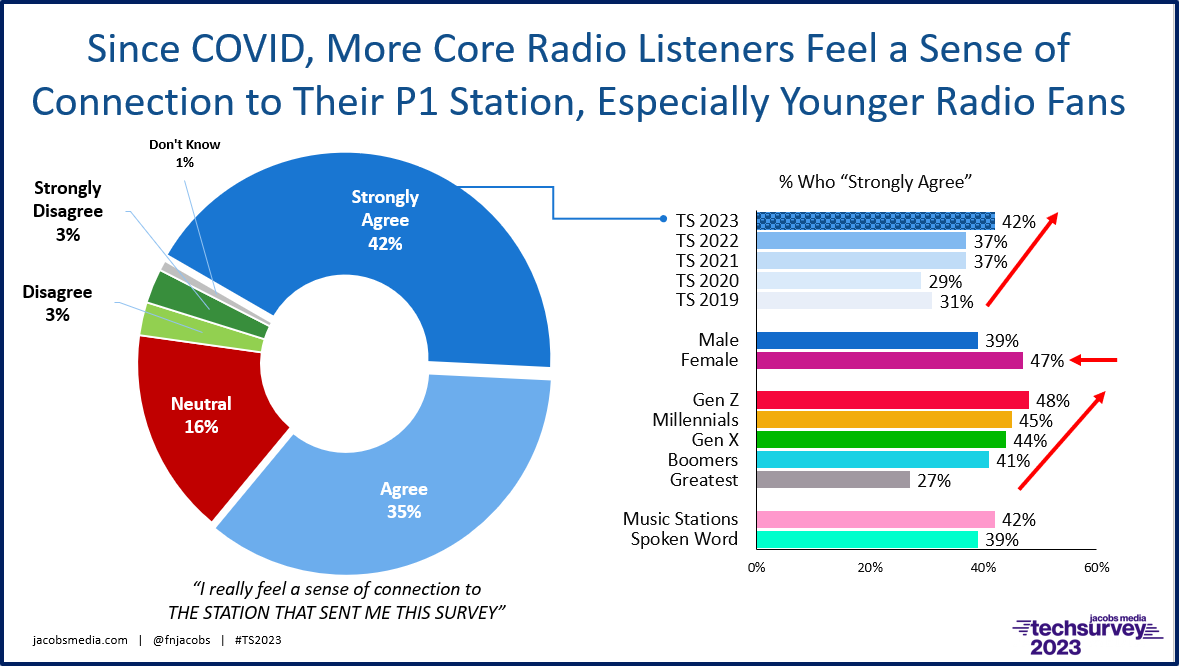
There’s been a lot of discussion, debate, and even handwringing about how technology is impacting radio – in addition to all of our lives and careers. As many realize, AI or the new Threads platform (which I talked about last week and Seth blogs about later today) mean very little to radio without content that matters. All these advancements are essentially meaningless without an audience that appreciates the brand and what it brings to their lives.
I’ve been thinking a lot about that these days, especially during often heated conversations about the personal touch. We are spending lots of time at Jacobs Media exploring AI applications like ElevenLabs – the technology that allowed us to create and produce my intro at the Country Radio Seminar last March in Nashville, featuring a greeting from an artist who referred to herself as “Taylor.” But those examples are parlor games and magic tricks, the little feats similar to the early days of apps that allowed your phone to fart on command.
Today, radio is facing much different challenges. It is less about whether stations use ChatGPT and related AI tools or put up a page on Threads. It will come down to whether stations have anything to say or do that will make a difference in people’s lives. Getting the attention of an audience and having an impact on their lives is now where the raised bar is situated. It’s not enough to play the hit of the summer of 2023 or from July of 1985. It’s not about running the same tried-and-true morning benchmark your show has featured at 7:20am for the last 12 years. And it’s just not impactful to send the van, the card table, and an intern or two to your town’s outdoor concert venue this summer.
You audience has been there, and done that. They need more to satisfy their emotional needs in the aftermath of the pandemic, on the heels of a presidential election that promises to be brutal and mind-numbing. Amidst all these big, bombastic events and “breaking news” stories, it may come down to how your station – and your personalities – manage to connect with an audience increasingly being desensitized and demoralized by the world around them.
In the last 10 days, I have received notes from people alerting me to examples of what is often known as EI – or Emotional Intelligence. The first was my wife. She sent me a TED Talks video from a former radio guy from Australia who recalled an interlude on his breakfast show that changed his life’s trajectory. While that is, in fact, the essence of the talk by Gus Worland is about suicide – all the people we love who live in silence. And along the way, an increasing number of these lives are being lost to suicide.
It’s a worthy use of your 13 minutes.
But that’s not the only reason it caught my attention. Worland’s epiphany occurred on the air. As he explains, his show was all about having fun, playing games, and helping people escape from the doldrums of their lives. Rather than Hollywood gossip or contest giveaways, Worland and his team told the story of his mentor who took his own life, a mystifying event for those who counted on and even worshipped this guy.
And then they broke format, throwing away the clock. And they took phones from listeners who lauded Worland for telling his story, as well as people pouring out their emotions about their lives. He put it this way:

“…what was truly happening behind me was all the phone lines into the radio station were flashing, which means people were phoning in. Normally those lines would be for you to ring up to be part of the show, to tell a joke, to win a concert ticket, to win a movie ticket. All of a sudden, all those lines were flashing. Didn’t quite realize why. The producer comes in and says, ‘We’ve got all these people that want to thank you for telling your story.’ I thought, that’s nice. I’ve put myself out there, It is nice to get a little bit of love like that.
“So we started putting a few calls through. Not only were they telling me, ‘Thank you for telling that story,’ more importantly, it was like we’d given them a green light, we’d given them permission to talk about the stuff that they wanted to talk about. All of a sudden, in a safe place, like a radio station where they’d normally laugh their way to work, we’d given them a little opportunity to talk about the stuff that’s truly important to them, the stuff that they had in their bellies, the stuff banging around in their heads that they never thought they would get a chance to talk about.
“So what we did for the next 90 minutes was just the most beautiful radio that I’ve ever been involved in. We took no traffic reports, no news reports, we played no music, we just had 90 minutes of people bumbling and fumbling and getting their way through a conversation of gravity with us in the radio studio.
“It was impressive that so many people went, ‘You know what, I’m diving in here. I’m talking about my stuff now because he spoke about that,’ all strangers listening to each other on the radio all gave each other permission to have a chat. There were moments of true silence, and silence in radio is not a good thing. However, when you have silence when you can sort of hear the tears, you can try to just hear them gathering the guts and determination to say the next word. Or you can basically hear the snot running out of the nose and the tears running out of the eyes, that’s when you know, people are being fair dinkum, that’s when you know that they’re being real.”
You can listen to the entire talk (which is worth your time) or cue up to 2:57 to hear Worland personally deliver the goods.
Think about it. Worland’s show was one of thousands of Morning Zoos on the radio, not unlike those that continue to drone on here in the States and in countless countries around the world. And the revelation that when we have the courage to “get real,” the audience is given permission to do the same. And they respond.
Give people a cause, a mission, a purpose – and they will respond, especially when it comes from a personality they genuinely like and respect. Once you hear Worland’s TED Talk, you can instantly understand why he was a successful presenter in Sydney. He’s warm, sincere, self-deprecating, and human. And those qualities emerge when he’s talking about something that matters – rather than “Hollywood Trash” or “What’s Trending?”
But chances are, many of you have some of these same traits and talents. You’re not just about reading cards or executing benchmarks. You’ve talked to enough people over the years – on the air, over the phone, eye-to-eye at events – that you know how to connect with real people, whether you’re in Pittsburgh, Pensacola, or Provo.
My other example comes from right here in the U.S. In the Great Midwest – Ohio, to be exact. WHBC engineer, Dale Lamm, was monitoring the competition while in the car with his wife. They’re listening to MTV VJ icon Martha Quinn on her syndicated show. It turns out the highly popular host started talking about her diagnosis of endometrial cancer. And as she began to reveal details about how it will be treated, Dale’s wife gets caught up in the story that’s coming out of the car speakers:
“My wife punched up the volume… she wanted to hear this. Martha went on to give details seldom heard on the air.
“(Martha) mentioned future chemo-radiation treatments. So now, the audience is interested in following her progress as the months go on.
“What I saw with my wife (and also experienced) was an instant connection to this DJ. I am certain that Martha had to discuss all this with someone higher up, but still, it takes guts to go on like that with news of a personal nature.
“AI ain’t gonna ever do that. We’ve been hearing the drumbeat saying radio is about one-on-one connections. This was just a smack in the face lesson on how that can work.”
Martha “got real,” because she is real, and her health news is real. She was talking about something meaningful and poignant to her audience. Coming clean with your community requires more courage and finesse than kicking off another commercial-free hour or promoting tomorrow’s car dealer remote. It’s hard, it’s painful, and you show your vulnerability. That’s what’s getting real is all about.
As my radio friend also noted, “getting real” is part of the process that so many radio shows, stations, and companies have forgotten about in their quest to drive web traffic, scale their stations’ geographic footprint, and hub their personalities and production. Martha Quinn is now a syndicated host who has built a deep connection with listeners – and viewers – for more than four decades, pouring her heart out about a health situation we can all relate to because everyone knows someone who has fought a battle. And for many audience members, it personal – they’ve waged their own war with cancer and other setbacks.
If you’re a regular listener to #TheMarthaQuinnShow you’ve prob noticed I’ve been off for about a month. Here’s why. She said with a lump in her throat and eyes stinging with tears https://t.co/6ZDzFnaAgi
— Martha Quinn Ⓥ (@MarthaQuinn) July 5, 2023
We saw this same emotion in motion at The Drive in Chicago where zany morning duo, Sherman & Tingle, confronted tragedy – at the same time. Each of their wives was diagnosed with cancer within weeks of one another. The guys took it to their show, shaving their respective heads in a show of unity and support for their wives. The video below shows the guys getting their cancer-friendly coiffeurs.
Some of you may remember when Don Imus was on The Fan in New York, he set aside one day a year to fundraise on behalf of the Sudden Infant Death Syndrome organization. The station’s GM and his wife, Joel and Susan Hollander, tragically lost an infant to SIDS, and Imus adopted the cause.

Yes, it ran against his type and reputation – the sarcastic curmudgeon – which was precisely why it worked so well. Imus got to show another side of his personality and soul. Isn’t that what getting real is all about?
At the core, people care about other people. They care about each other. They just need an outlet to express that caring and compassion. Where else but on the radio?
For the last three years, Paul and I have gotten close to the good work being done by scores of radio stations all over the U.S. and Canada in collaboration with the Children’s Miracle Network Hospitals’ team and the local hospitals with whom they support. Despite the travails of the economy and the ravages of COVID, radio listeners continue to donate and contribute at a strong pace.
Hospitals’ team and the local hospitals with whom they support. Despite the travails of the economy and the ravages of COVID, radio listeners continue to donate and contribute at a strong pace.
Aside from doing something meaningful for the kids in their communities, they respond to the appeals made by radio stations and their personalities who “get real.”
We’ve interviewed a number of donors that generously give during these Radiothon events. They become hooked by the real stories of sick children and their parents, navigating very difficult waters. And the audience connects with members of the airstaff who take the time and make the effort to get to know these local warriors. This activity transcends playing hit music, giving away cash, or zany morning show bits. They remind listeners of how radio can change lives, setting it apart from podcasts, streams, and satellite radio.
And it reminds me of a growing trend we can’t help but notice in our Techsurveys – the ability for stations to make strong emotional connections with their listeners. It’s been heading straight up since COVID, cementing important bonds between the station and the audience. And it’s of particular importance to women as well as to progressively younger station fans. It’s a reminder the potential for radio is there when stations have the foresight and guts to “get real.”

Picking up on Gus Worland’s TED Talk, opening up those phone lines to listeners might not be an everyday affair for most stations. It might become a little intensive on the way to (or from) work. But on a weekly or less frequent basis, you can envision how well-programmed “reality checks” could pay dividends – in the ratings and to facilitate brand building.
As a former programmer, I know you cannot “program” these moments on a log. If they sound forced or contrived, they aren’t genuine. And you can’t benchmark them into a feature. If the opportunity happens and your station and/or your show is in position, you can indeed go for it.
I know not everyone will respond positively to their station opening up or their personalities being vulnerable. If that’s the case, don’t do it.
Or that a show’s entire purpose is to be the antidote to “bad news.” If that’s the case, don’t do it.
Or that no one calls radio stations anymore. No one will call no matter what we say. I think part of the reason why phone calls have become virtually extinct at so many stations is that listeners know their voice will not be heard on the air or that their calls will just endlessly ring in a studio devoid of people. If that’s the case, don’t do it.
When the excuses run out, you just might find out there’s an audience out there in the wild willing to pitch in, share their stories, show empathy for their fellow listeners. And it feels like there is no better time for radio take off the mask of artificiality and use its reputation and reach to truly make a connection when people need it most.
In other words, get real.
Learn more about Gus Worland’s Gotcha4Life foundation here.
- Media And Technology In 2025: Believe It Or Not! - April 18, 2025
- In Radio, You Just Never Know - April 17, 2025
- The Secret To Making A Great Podcast (And Great Radio) - April 16, 2025




It sure would be nice if some of the news/talk stations would get real instead of endless hours of political diatribe, much of it syndicated from outside the market. Even syndication that puts politics aside and discusses real issues would be preferable to these ears. Another problem is that fewer on-air people either have the skills or the technical ability to open the phone lines if they’re doing their show via VT or remotely. Too many studios are empty too many hours a day. Most stations don’t respond to major events, be they weather-related or other emergency situations, because nobody’s in the building minding the store. Radio used to be the place where immediacy was its biggest strength. In too many cases, immediacy has been lost.
Most who run those news/talkers are not convinced there’s any other way to play this. As for phone skills, you are right that many on the air lack the muscle memory needed. But it is a skill that can be acquired. It is how you reflect your community. Thanks, Brian.
Being real, truthful, and vulnerable should be at the core of every show and at every format. Don’t force funny. Funny will happen…when it’s real. Now, how many GM’s and members of upper management will get out of the way and allow their talent the freedom to truly be “real” on the air? Or will they demand the same lame benchmarks, traffic & weather breaks the audience is leaving the medium for by the masses?
Real wins, separates you from the competition, and isn’t found in any prep service.
No, it’s not, Matt. Appreciate you pointing it out.
Way back when I worked in Detroit at what was then Magic 95 doing mornings, I cannot remember if it was Bob Heneberry or Paul Christy gave me the best advice in a coaching session. He said before you open that mic, figure out how you’re going to “touch” someone listening. Make a little difference in their day. I’ve passed that on many times over the years. How radio can do that may have changed, but the essence of that touch is the same.
That doesn’t surprise me, coming from Paul. He was one of the finest people I’ve met in the business, and was as human off the air as we wanted his stations to sound.
Agreed. We became good friends over the years and spent many lunches at delis and Coney Islands…including one he owned!
Gus Worland’s former radio employer (Triple M) has been involved with a fairly similar campaign for the past few years…
https://www.mediaweek.com.au/triple-m-no-talk-day
Always appreciate the international POV, Eric. Thanks!
Interesting that this blog was discussing AI generated radio content and hosts just a number of days ago and now is confronting pretty much the opposite. IMO, more real and less AI are is probably the best plan for radio.
Thank goodness Fred is talking about both. Best way to beat an enemy (AI) is to understand it.
Spot-on, Bob.
Just might be the most important article that you ever penned. Terrestrial is in real time trouble. Just look at the stock exchange or the delistings. Fact is, It has been a growth industry since consolidation. But It’s hallmark was always local outreach …..and can be again in a different way.
Appreciate that, Jimmy. Change is in the air, that’s for sure. And we’re on the same page about “local” still being that secret sauce.